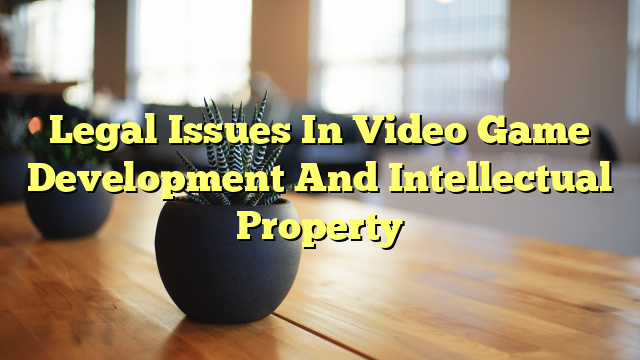Table of Contents
- What are legal issues and intellectual property?
- How does intellectual property apply to video games?
- Why is intellectual property important to game development?
- How to protect your intellectual property in the games industry?
What are legal issues and intellectual property?
Legal issues and intellectual property are two topics that game developers must understand and consider when creating video games. Legal issues can refer to a variety of things, such as copyright law, contract law, trademark law, or privacy law. Intellectual property encompasses a variety of creations, such as books, songs, movies, and video games. It is the legal right to own something that has been created, and the protection of that creation from being used or copied without the creator’s permission.
Intellectual property law is important for creators, as it gives them the right to control how their work is used. Without intellectual property law, people would be able to freely use and copy someone else’s work without compensating the creator. As such, creators would have little incentive to create new works, as they would not be able to make a living from their work.
How does intellectual property apply to video games?
Intellectual property law applies to video games in a variety of ways. Game developers own the rights to their video games, meaning that they can control how their games are used. This includes the right to control who can play the game, as well as how and where the game is distributed. It also includes the right to control who makes derivative works based on the original game, such as spin-offs or mobile versions.
In addition, game developers have the right to control the use of their game’s artwork, music, and other content. This means that they can control who can use the game’s content, as well as how it is used. This is important for game developers, as it allows them to protect their brand and to ensure that their work is not used without their permission.
Why is intellectual property important to game development?
Intellectual property is essential to game development, as it allows game developers to protect their creations. Without intellectual property protection, game developers would not be able to control how their work is used or who can use it. This would mean that anyone could copy their game or use their work without permission or compensation.
In addition, intellectual property law allows game developers to make money from their work. When a game is released, the developer can charge money for people to play or download it. This income can then be used to fund future projects, pay the developers, or cover the cost of marketing and distribution. Without intellectual property protection, game developers would not be able to make money from their work.
How to protect your intellectual property in the games industry?
Game developers can protect their intellectual property in several ways. The first step is to make sure that all game assets, such as artwork, music, and code, are properly copyrighted. Copyrighting a work ensures that it is legally protected and registered with the government.
Game developers should also consider using trademarks and patents to further protect their work. Trademarks protect game titles and logos, while patents protect inventions or processes used in a game. Additionally, game developers can use licensing agreements to control who can use their game’s content.
Finally, game developers should be aware of laws such as the Digital Millennium Copyright Act (DMCA) which protect game developers from copyright infringement. The DMCA outlines the rights of creators and provides legal remedies if their work is used without permission.

